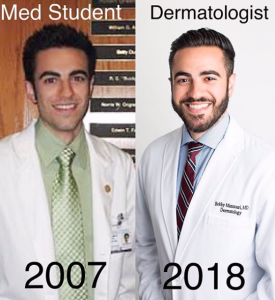Imposter syndrome, or the imposter phenomenon, is probably something all physicians have faced in the earlier stages of their careers. It’s the feeling that you will be exposed as a fraud. It’s the notion that you are incompetent despite overwhelming evidence that you are, in fact, fully trained, trustworthy, and competent.
The White Coat
If I had to guess, I would say white coats are a big reason why many of us feel like imposters. The white coat is one of the most iconic symbols in healthcare. For decades, the white coat has been synonymous with physicians. White coats depict doctors on television or in movies. White coats are worn in all shapes, sizes, and fashions to signal to those around you what rank you hold on the healthcare team. They are even ceremoniously given to incoming medical students to mark their upcoming foray into the world of clinical medicine. Some would even argue that the adoption of wearing white coats by other health professionals confuses patients, as they expect their doctor to be the one in the white coat. In our culture, white coat equals doctor.
I remember the first time I wore my boxy, ill-fitting, short white coat to see a patient. It felt like my white coat was magical. I was allowed to ask the most personal information. “Do you prefer sex with men, women, or both?” “When was your last menstrual cycle?” “Have you ever had any STDs?” Oh, the joys of Ob/Gyn. And I couldn’t believe it. Not only would patients answer my questions, they didn’t find it strange that I would ask. Patients would let me poke them with needles, deliver their babies, examine them from head to toe, and they would thank me for doing my job. It felt like my white coat gave me some sort of special power.
Do I know what I’m doing?
My white coat may have seemed magical, but it was not lost on me that I barely knew what I was doing in medical school. I worked hard to learn as much as I could, care for patients, and be a solid member of any team I was on. But I knew I wasn’t fully competent, because I was constantly surrounded by people who had longer white coats and who obviously knew what they were doing. I took solace in the fact that when I got to that stage in my career, I would know what I was doing, too. As for my medical school days, I’d simply keeping rocking that short white coat and hope no one mistook me for a real doctor.
Graduation and Residency

And one day, the reality set in. It was medical school graduation – I received my M.D. I had worked four years for this degree and in a few short months, I would be an intern in charge of the care of real hospital patients, placing real orders for real nurses to carry out, and doing real procedures – all of which would have very real consequences. But was I ready?
There were so many new ways to feel like an imposter during residency. I wore a long white coat (like all of the real, grown up doctors) for the first time. I started referring to myself as “Dr. Mansouri” to patients. Nurses, pharmacists, medical students, and patients would all call me Dr. Mansouri, too. I would quickly correct them with, “You can just call me Bobby. It’s easier.”
As the years passed in residency, I began to feel more confident in my skills as a physician. Being referred to as “doctor” started to feel less strange. It became more commonplace to wear my long white coat. But feeling like a fraud never fully went away. It simply became less frequent. I remember I was once taking a layer while performing Mohs surgery on a patient’s cheek and thought, “Should I be allowed to cut on someone’s face with a scalpel?” Of course, I was not only allowed, but I had done it 100+ times before and done it well.
Not an Imposter
 I’ve completed four years of college, four years of medical school, a one-year internship, and three years of dermatology-specific residency training while logging between 12,000 to 16,000 hours of patient care and enduring the process to becoming a board-certified dermatologist by the American Board of Dermatology. And I still wish I knew more. Sometimes, I second guess myself while making clinical decisions. Sometimes it still feels weird to put on my white coat and call myself Dr. Mansouri. Sometimes, I wonder why patients trust me. Sometimes, I still feel like an imposter.
I’ve completed four years of college, four years of medical school, a one-year internship, and three years of dermatology-specific residency training while logging between 12,000 to 16,000 hours of patient care and enduring the process to becoming a board-certified dermatologist by the American Board of Dermatology. And I still wish I knew more. Sometimes, I second guess myself while making clinical decisions. Sometimes it still feels weird to put on my white coat and call myself Dr. Mansouri. Sometimes, I wonder why patients trust me. Sometimes, I still feel like an imposter.
But the fact is, I’m not an imposter and I’m not a fraud. I’m a fully-trained, competent, and capable board-certified dermatologist.
I’m not sure why I still feel like an imposter sometimes. Maybe it’s because of my white coat and all that it symbolizes. Maybe it’s my type A personality. Or maybe it’s because I’m living out my dreams.
Any of us who have been fortunate enough to become physicians have, at some point, dreamed of achieving this goal. Whether you had dreamed of being a doctor from the time you were 5-years-old, or your dream started in high school, college, or beyond, the fact remains that we are fortunate to be living out our dreams. And sometimes when you dream, it seems too good to be true. You second guess your dream. You pinch yourself to see if it’s real. And that’s what imposter syndrome is to me. It’s pinching myself while remembering that I am living my dream.
So, the next time you wonder if you’re an imposter or a fraud, even though you know full well you are a fully capable physician, maybe try pinching yourself as a reminder that you’re not dreaming. You’re a doctor.
Did you enjoy this post? Find more topics on Navigating Your Career here.

